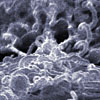
Syphilis is a sexually transmitted disease caused by the bacterium Treponema pallidum. It spreads mainly by sexual contact, but may also be transmitted by infected mothers to their unborn children.
Syphilis produces an ulcer known as a chancre ("shanker") at the spot where the disease entered the body. It appears from 10 days to two months after infection.
If left untreated, the chancre will be followed by a rash and other symptoms. Syphilis can eventually lead to such nervous system disorders as blindness, insanity or paralysis.
A person who has syphilis is 3 to 5 times more likely to catch and pass on HIV (human immunodeficiency virus), the virus that causes AIDS.
Additional Resources- Getting tested for syphilis
- The U.S. Centers for Disease Control and Prevention (CDC)
- National Women's Health Information Center
For more information or for testing, contact:
- A county health department near you
- MSDH's Health Info Hotline: 1-866-HLTHY4U (1-866-458-4948)

